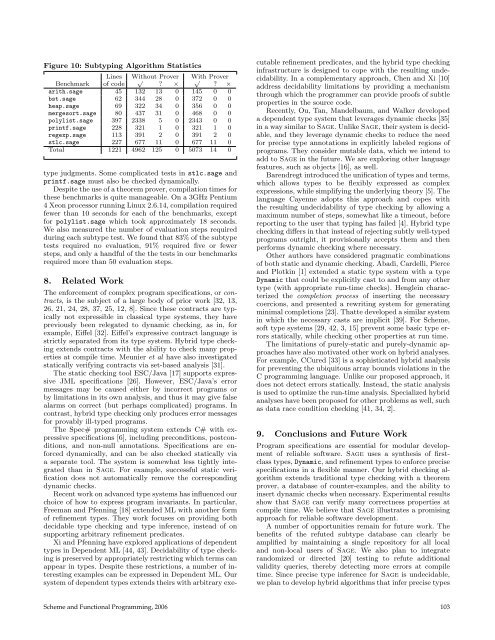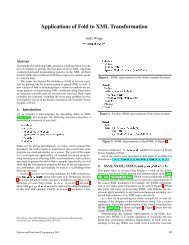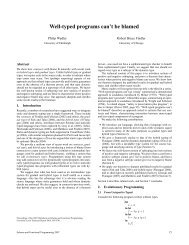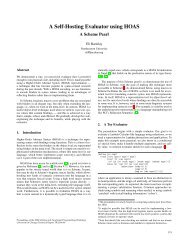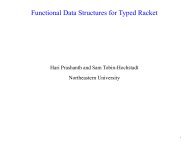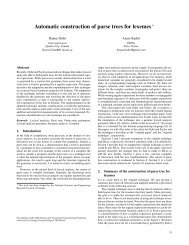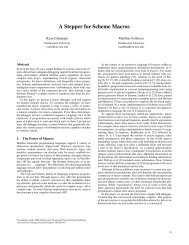2006 Scheme and Functional Programming Papers, University of
2006 Scheme and Functional Programming Papers, University of
2006 Scheme and Functional Programming Papers, University of
Create successful ePaper yourself
Turn your PDF publications into a flip-book with our unique Google optimized e-Paper software.
Figure 10: Subtyping Algorithm Statistics<br />
Lines Without<br />
√<br />
Prover With<br />
√<br />
Prover<br />
Benchmark <strong>of</strong> code<br />
? ×<br />
? ×<br />
arith.sage 45 132 13 0 145 0 0<br />
bst.sage 62 344 28 0 372 0 0<br />
heap.sage 69 322 34 0 356 0 0<br />
mergesort.sage 80 437 31 0 468 0 0<br />
polylist.sage 397 2338 5 0 2343 0 0<br />
printf.sage 228 321 1 0 321 1 0<br />
regexp.sage 113 391 2 0 391 2 0<br />
stlc.sage 227 677 11 0 677 11 0<br />
Total 1221 4962 125 0 5073 14 0<br />
type judgments. Some complicated tests in stlc.sage <strong>and</strong><br />
printf.sage must also be checked dynamically.<br />
Despite the use <strong>of</strong> a theorem prover, compilation times for<br />
these benchmarks is quite manageable. On a 3GHz Pentium<br />
4 Xeon processor running Linux 2.6.14, compilation required<br />
fewer than 10 seconds for each <strong>of</strong> the benchmarks, except<br />
for polylist.sage which took approximately 18 seconds.<br />
We also measured the number <strong>of</strong> evaluation steps required<br />
during each subtype test. We found that 83% <strong>of</strong> the subtype<br />
tests required no evaluation, 91% required five or fewer<br />
steps, <strong>and</strong> only a h<strong>and</strong>ful <strong>of</strong> the the tests in our benchmarks<br />
required more than 50 evaluation steps.<br />
8. Related Work<br />
The enforcement <strong>of</strong> complex program specifications, or contracts,<br />
is the subject <strong>of</strong> a large body <strong>of</strong> prior work [32, 13,<br />
26, 21, 24, 28, 37, 25, 12, 8]. Since these contracts are typically<br />
not expressible in classical type systems, they have<br />
previously been relegated to dynamic checking, as in, for<br />
example, Eiffel [32]. Eiffel’s expressive contract language is<br />
strictly separated from its type system. Hybrid type checking<br />
extends contracts with the ability to check many properties<br />
at compile time. Meunier et al have also investigated<br />
statically verifying contracts via set-based analysis [31].<br />
The static checking tool ESC/Java [17] supports expressive<br />
JML specifications [26]. However, ESC/Java’s error<br />
messages may be caused either by incorrect programs or<br />
by limitations in its own analysis, <strong>and</strong> thus it may give false<br />
alarms on correct (but perhaps complicated) programs. In<br />
contrast, hybrid type checking only produces error messages<br />
for provably ill-typed programs.<br />
The Spec# programming system extends C# with expressive<br />
specifications [6], including preconditions, postconditions,<br />
<strong>and</strong> non-null annotations. Specifications are enforced<br />
dynamically, <strong>and</strong> can be also checked statically via<br />
a separate tool. The system is somewhat less tightly integrated<br />
than in Sage. For example, successful static verification<br />
does not automatically remove the corresponding<br />
dynamic checks.<br />
Recent work on advanced type systems has influenced our<br />
choice <strong>of</strong> how to express program invariants. In particular,<br />
Freeman <strong>and</strong> Pfenning [18] extended ML with another form<br />
<strong>of</strong> refinement types. They work focuses on providing both<br />
decidable type checking <strong>and</strong> type inference, instead <strong>of</strong> on<br />
supporting arbitrary refinement predicates.<br />
Xi <strong>and</strong> Pfenning have explored applications <strong>of</strong> dependent<br />
types in Dependent ML [44, 43]. Decidability <strong>of</strong> type checking<br />
is preserved by appropriately restricting which terms can<br />
appear in types. Despite these restrictions, a number <strong>of</strong> interesting<br />
examples can be expressed in Dependent ML. Our<br />
system <strong>of</strong> dependent types extends theirs with arbitrary executable<br />
refinement predicates, <strong>and</strong> the hybrid type checking<br />
infrastructure is designed to cope with the resulting undecidability.<br />
In a complementary approach, Chen <strong>and</strong> Xi [10]<br />
address decidability limitations by providing a mechanism<br />
through which the programmer can provide pro<strong>of</strong>s <strong>of</strong> subtle<br />
properties in the source code.<br />
Recently, Ou, Tan, M<strong>and</strong>elbaum, <strong>and</strong> Walker developed<br />
a dependent type system that leverages dynamic checks [35]<br />
in a way similar to Sage. Unlike Sage, their system is decidable,<br />
<strong>and</strong> they leverage dynamic checks to reduce the need<br />
for precise type annotations in explicitly labeled regions <strong>of</strong><br />
programs. They consider mutable data, which we intend to<br />
add to Sage in the future. We are exploring other language<br />
features, such as objects [16], as well.<br />
Barendregt introduced the unification <strong>of</strong> types <strong>and</strong> terms,<br />
which allows types to be flexibly expressed as complex<br />
expressions, while simplifying the underlying theory [5]. The<br />
language Cayenne adopts this approach <strong>and</strong> copes with<br />
the resulting undecidability <strong>of</strong> type checking by allowing a<br />
maximum number <strong>of</strong> steps, somewhat like a timeout, before<br />
reporting to the user that typing has failed [4]. Hybrid type<br />
checking differs in that instead <strong>of</strong> rejecting subtly well-typed<br />
programs outright, it provisionally accepts them <strong>and</strong> then<br />
performs dynamic checking where necessary.<br />
Other authors have considered pragmatic combinations<br />
<strong>of</strong> both static <strong>and</strong> dynamic checking. Abadi, Cardelli, Pierce<br />
<strong>and</strong> Plotkin [1] extended a static type system with a type<br />
Dynamic that could be explicitly cast to <strong>and</strong> from any other<br />
type (with appropriate run-time checks). Henglein characterized<br />
the completion process <strong>of</strong> inserting the necessary<br />
coercions, <strong>and</strong> presented a rewriting system for generating<br />
minimal completions [23]. Thatte developed a similar system<br />
in which the necessary casts are implicit [39]. For <strong>Scheme</strong>,<br />
s<strong>of</strong>t type systems [29, 42, 3, 15] prevent some basic type errors<br />
statically, while checking other properties at run time.<br />
The limitations <strong>of</strong> purely-static <strong>and</strong> purely-dynamic approaches<br />
have also motivated other work on hybrid analyses.<br />
For example, CCured [33] is a sophisticated hybrid analysis<br />
for preventing the ubiquitous array bounds violations in the<br />
C programming language. Unlike our proposed approach, it<br />
does not detect errors statically. Instead, the static analysis<br />
is used to optimize the run-time analysis. Specialized hybrid<br />
analyses have been proposed for other problems as well, such<br />
as data race condition checking [41, 34, 2].<br />
9. Conclusions <strong>and</strong> Future Work<br />
Program specifications are essential for modular development<br />
<strong>of</strong> reliable s<strong>of</strong>tware. Sage uses a synthesis <strong>of</strong> firstclass<br />
types, Dynamic, <strong>and</strong> refinement types to enforce precise<br />
specifications in a flexible manner. Our hybrid checking algorithm<br />
extends traditional type checking with a theorem<br />
prover, a database <strong>of</strong> counter-examples, <strong>and</strong> the ability to<br />
insert dynamic checks when necessary. Experimental results<br />
show that Sage can verify many correctness properties at<br />
compile time. We believe that Sage illustrates a promising<br />
approach for reliable s<strong>of</strong>tware development.<br />
A number <strong>of</strong> opportunities remain for future work. The<br />
benefits <strong>of</strong> the refuted subtype database can clearly be<br />
amplified by maintaining a single repository for all local<br />
<strong>and</strong> non-local users <strong>of</strong> Sage. We also plan to integrate<br />
r<strong>and</strong>omized or directed [20] testing to refute additional<br />
validity queries, thereby detecting more errors at compile<br />
time. Since precise type inference for Sage is undecidable,<br />
we plan to develop hybrid algorithms that infer precise types<br />
<strong>Scheme</strong> <strong>and</strong> <strong>Functional</strong> <strong>Programming</strong>, <strong>2006</strong> 103


